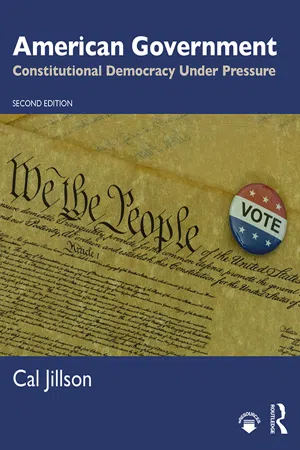
American Government
Constitutional Democracy Under Pressure
- 362 pages
- English
- ePUB (mobile friendly)
- Available on iOS & Android
About this book
American Government: Constitutional Democracy Under Pressure highlights the necessary tension between our constitutional principles and institutions and the populist heat that sometimes roils our national politics, especially at the current political moment. Our constitutional democracy has been under pressure for some time, but few would deny that fears for its fate have deepened in just the past few years. We assume that our political institutions will limit and contain contemporary populism, just as the Founders intended and as they have in the past, but will they? An increasingly polarized electorate, urging their representatives to fight and never to compromise, may be stressing Constitutional limits. This new edition offers to help American government teachers lead their students to a nuanced theoretical and practical understanding of what is happening in the politics of their Constitutional democracy today.
New to the Second Edition
-
- Further develops and highlights the distinguishing theme of the book, "Constitutional Democracy Under Pressure, " in light of Trump Administration events over the last two years.
-
- Expands coverage of all media aspects including fake news, social media, responsible journalism, and related topics including foreign manipulation of the news.
-
- Includes the most recent election results.
-
- Addresses issues specific to the Trump Administration including unique coverage of the 25th Amendment, cabinet instability, election interferences, executive power and unitary action, and impact on the courts.
-
- Updates in all tables, figures, suggested readings plus photo updates throughout.
Frequently asked questions
- Essential is ideal for learners and professionals who enjoy exploring a wide range of subjects. Access the Essential Library with 800,000+ trusted titles and best-sellers across business, personal growth, and the humanities. Includes unlimited reading time and Standard Read Aloud voice.
- Complete: Perfect for advanced learners and researchers needing full, unrestricted access. Unlock 1.4M+ books across hundreds of subjects, including academic and specialized titles. The Complete Plan also includes advanced features like Premium Read Aloud and Research Assistant.
Please note we cannot support devices running on iOS 13 and Android 7 or earlier. Learn more about using the app.
Information
Chapter 1
The Revolution and the Constitution


The Founders and the People

The European Roots of American Politics
Table of contents
- Cover
- Half Title
- Endorsements
- Title Page
- Copyright Page
- Dedication
- Who to Believe
- Table of Contents
- special features
- Preface
- Acknowledgments
- The Author
- Chapter 1. The Revolution and the Constitution
- Chapter 2. Federalism and the American Constitutional Order
- Chapter 3. Civil Liberties: Democracy and the Expansion of Liberty’s Realm
- Chapter 4. Civil Rights: Where Liberty and Equality Collide
- Chapter 5. Shaping Americans: Political Socialization, Public Opinion, and the Media
- Chapter 6. Factions Today: Interest Groups and Political Parties
- Chapter 7. Democracy’s Moment: Voting, Campaigns, and Elections
- Chapter 8. Congress: Partisanship, Polarization, and Gridlock
- Chapter 9. The Executive Branch: The President, the Bureaucracy, and Executive Power
- Chapter 10. The Federal Courts: Originalism versus Living Constitutionalism
- Appendix A: The declaration of independence A–1
- Appendix B: Constitution of the united states B–1
- Appendix C: Federalist numbers 10, 51, and 78 C–1
- Index I-1